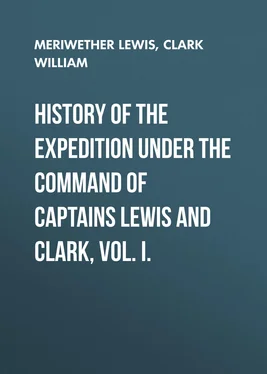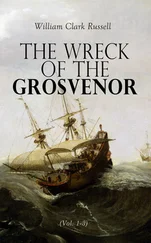William Clark - History of the Expedition under the Command of Captains Lewis and Clark, Vol. I.
Здесь есть возможность читать онлайн «William Clark - History of the Expedition under the Command of Captains Lewis and Clark, Vol. I.» — ознакомительный отрывок электронной книги совершенно бесплатно, а после прочтения отрывка купить полную версию. В некоторых случаях можно слушать аудио, скачать через торрент в формате fb2 и присутствует краткое содержание. Жанр: Путешествия и география, История, foreign_edu, foreign_antique, foreign_prose, на английском языке. Описание произведения, (предисловие) а так же отзывы посетителей доступны на портале библиотеки ЛибКат.
- Название:History of the Expedition under the Command of Captains Lewis and Clark, Vol. I.
- Автор:
- Жанр:
- Год:неизвестен
- ISBN:нет данных
- Рейтинг книги:5 / 5. Голосов: 1
-
Избранное:Добавить в избранное
- Отзывы:
-
Ваша оценка:
- 100
- 1
- 2
- 3
- 4
- 5
History of the Expedition under the Command of Captains Lewis and Clark, Vol. I.: краткое содержание, описание и аннотация
Предлагаем к чтению аннотацию, описание, краткое содержание или предисловие (зависит от того, что написал сам автор книги «History of the Expedition under the Command of Captains Lewis and Clark, Vol. I.»). Если вы не нашли необходимую информацию о книге — напишите в комментариях, мы постараемся отыскать её.
History of the Expedition under the Command of Captains Lewis and Clark, Vol. I. — читать онлайн ознакомительный отрывок
Ниже представлен текст книги, разбитый по страницам. Система сохранения места последней прочитанной страницы, позволяет с удобством читать онлайн бесплатно книгу «History of the Expedition under the Command of Captains Lewis and Clark, Vol. I.», без необходимости каждый раз заново искать на чём Вы остановились. Поставьте закладку, и сможете в любой момент перейти на страницу, на которой закончили чтение.
Интервал:
Закладка:
Friday, September 28, after dragging unsuccessfully for the anchor, we wished to set sail, it was with great difficulty that we could make the chiefs leave the boat. At length we got rid of all except the great chief; when just as we were setting out, several of the chief's soldiers sat on the rope which held the boat to the shore. Irritated at this we got every thing ready to fire on them if they persisted, but the great chief said that these were his soldiers and only wanted some tobacco. We had already refused a flag and some tobacco to the second chief, who had demanded it with great importunity; but willing to leave them without going to extremities, we threw him a carrot of tobacco, saying to him, "You have told us that you were a great man, and have influence; now show your influence, by taking the rope from those men, and we will then go without any further trouble." This appeal to his pride had the desired effect; he went out of the boat, gave the soldiers the tobacco, and pulling the rope out of their hands delivered it on board, and we then set sail under a breeze from the S.E. After sailing about two miles we observed the third chief beckoning to us: we took him on board, and he informed us that the rope had been held by the order of the second chief, who was a double-faced man. A little farther on we were joined by the son of the chief, who came on board to see his father. On his return we sent a speech to the nation, explaining what we had done, and advising them to peace; but if they persisted in their attempts to stop us, we were willing and able to defend ourselves. After making six miles, during which we passed a willow island on the south and one sandbar, we encamped on another in the middle of the river. The country on the south-side was a low prairie, that on the north highland.
September 29. We set out early, but were again impeded by sandbars, which made the river shallow; the weather was however fair; the land on the north side low and covered with timber contrasted with the bluffs to the south. At nine o'clock we saw the second chief and two women and three men on shore, who wished us to take two women offered by the second chief to make friends, which was refused; he then requested us to take them to the other band of their nation, who were on the river not far from us: this we declined; but in spite of our wishes they followed us along shore. The chief asked us to give them some tobacco; this we did, and gave more as a present for that part of the nation which we did not see. At seven and a half miles we came to a small creek on the southern side, where we saw great numbers of elk, and which we called Notimber creek from its bare appearance. Above the mouth of this stream, a Ricara band of Pawnees had a village five years ago: but there are no remains of it except the mound which encircled the town. Here the second chief went on shore. We then proceeded, and at the distance of eleven miles encamped on the lower part of a willow island, in the middle of the river, being obliged to substitute large stones in the place of the anchor which we lost.
September 30. The wind was this morning very high from the southeast, so that we were obliged to proceed under a double-reefed mainsail, through the rain. The country presented a large low prairie covered with timber on the north side; on the south, we first had high barren hills, but after some miles it became of the same character as that on the opposite side. We had not gone far when an Indian ran after us, and begged to be carried on board as far as the Ricaras, which we refused: soon after, we discovered on the hills at a distance, a great number of Indians, who came towards the river and encamped ahead of us. We stopped at a sandbar, at about eleven miles, and after breakfasting proceeded on a short distance to their camp, which consisted of about four hundred souls. We anchored one hundred yards from the shore, and discovering that they were Tetons belonging to the band which we had just left: we told them that we took them by the hand, and would make each chief a present of tobacco; that we had been badly treated by some of their band, and that having waited for them two days below, we could not stop here, but referred them to Mr. Durion for our talk and an explanation of our views: they then apologized for what had past, assured us that they were friendly, and very desirous that we should land and eat with them: this we refused, but sent the periogue on shore with the tobacco, which was delivered to one of the soldiers of the chief, whom we had on board. Several of them now ran along the shore after us, but the chief threw them a twist of tobacco, and told them to go back and open their ears to our counsels; on which they immediately returned to their lodges. We then proceeded past a continuation of the low prairie on the north, where we had large quantities of grapes, and on the south saw a small creek and an island. Six miles above this, two Indians came to the bank, looked at us about half an hour, and then went without speaking over the hills to the southwest. After some time, the wind rose still higher, and the boat struck a log, turned, and was very near taking in water. The chief became so much terrified at the danger, that he hid himself in the boat, and as soon as we landed got his gun and told us that he wanted to return, that we would now see no more Tetons, and that we might proceed unmolested: we repeated the advice we had already given, presented him with a blanket, a knife, some tobacco, and after smoking with him he set out. We then continued to a sandbar on the north side, where we encamped, having come twenty and a half miles. In the course of the day we saw a number of sandbars which impede the navigation. The only animal which we observed was the white gull, then in great abundance.
October 1st, 1804. The weather was very cold and the wind high from the southeast during the night, and continued so this morning. At three miles distance, we had passed a large island in the middle of the river, opposite to the lower end of which the Ricaras once had a village on the south side of the river: there are, however, no remnants of it now, except a circular wall three or four feet in height, which encompassed the town. Two miles beyond this island is a river coming in from the southwest, about four hundred yards wide; the current gentle, and discharging not much water, and very little sand: it takes its rise in the second range of the Cote Noire or Black mountains, and its general course is nearly east; this river has been occasionally called Dog river, under a mistaken opinion that its French name was Chien, but its true appellation is Chayenne, and it derives this title from the Chayenne Indians: their history is the short and melancholy relation of the calamities of almost all the Indians. They were a numerous people and lived on the Chayenne, a branch of the Red river of Lake Winnipeg. The invasion of the Sioux drove them westward; in their progress they halted on the southern side of the Missouri below the Warreconne, where their ancient fortifications still exist; but the same impulse again drove them to the heads of the Chayenne, where they now rove, and occasionally visit the Ricaras. They are now reduced, but still number three hundred men.
Although the river did not seem to throw out much sand, yet near and above its mouth we find a great many sandbars difficult to pass. On both sides of the Missouri, near the Chayenne, are rich thinly timbered lowlands, behind which are bare hills. As we proceeded, we found that the sandbars made the river so shallow, and the wind was so high, that we could scarcely find the channel, and at one place were forced to drag the boat over a sandbar, the Missouri being very wide and falling a little. At seven and a half miles we came to at a point, and remained three hours, during which time the wind abated: we then passed within four miles two creeks on the south, one of which we called Centinel creek, and the other Lookout creek. This part of the river has but little timber; the hills are not so high as we have hitherto seen, and the number of sandbars extends the river to more than a mile in breadth. We continued about four and a half miles further, to a sandbar in the middle of the river, where we spent the night, our progress being sixteen miles. On the opposite shore, we saw a house among the willows and a boy to whom we called, and brought him on board. He proved to be a young Frenchman in the employ of a Mr. Valle a trader, who is now here pursuing his commerce with the Sioux.
Читать дальшеИнтервал:
Закладка:
Похожие книги на «History of the Expedition under the Command of Captains Lewis and Clark, Vol. I.»
Представляем Вашему вниманию похожие книги на «History of the Expedition under the Command of Captains Lewis and Clark, Vol. I.» списком для выбора. Мы отобрали схожую по названию и смыслу литературу в надежде предоставить читателям больше вариантов отыскать новые, интересные, ещё непрочитанные произведения.
Обсуждение, отзывы о книге «History of the Expedition under the Command of Captains Lewis and Clark, Vol. I.» и просто собственные мнения читателей. Оставьте ваши комментарии, напишите, что Вы думаете о произведении, его смысле или главных героях. Укажите что конкретно понравилось, а что нет, и почему Вы так считаете.












